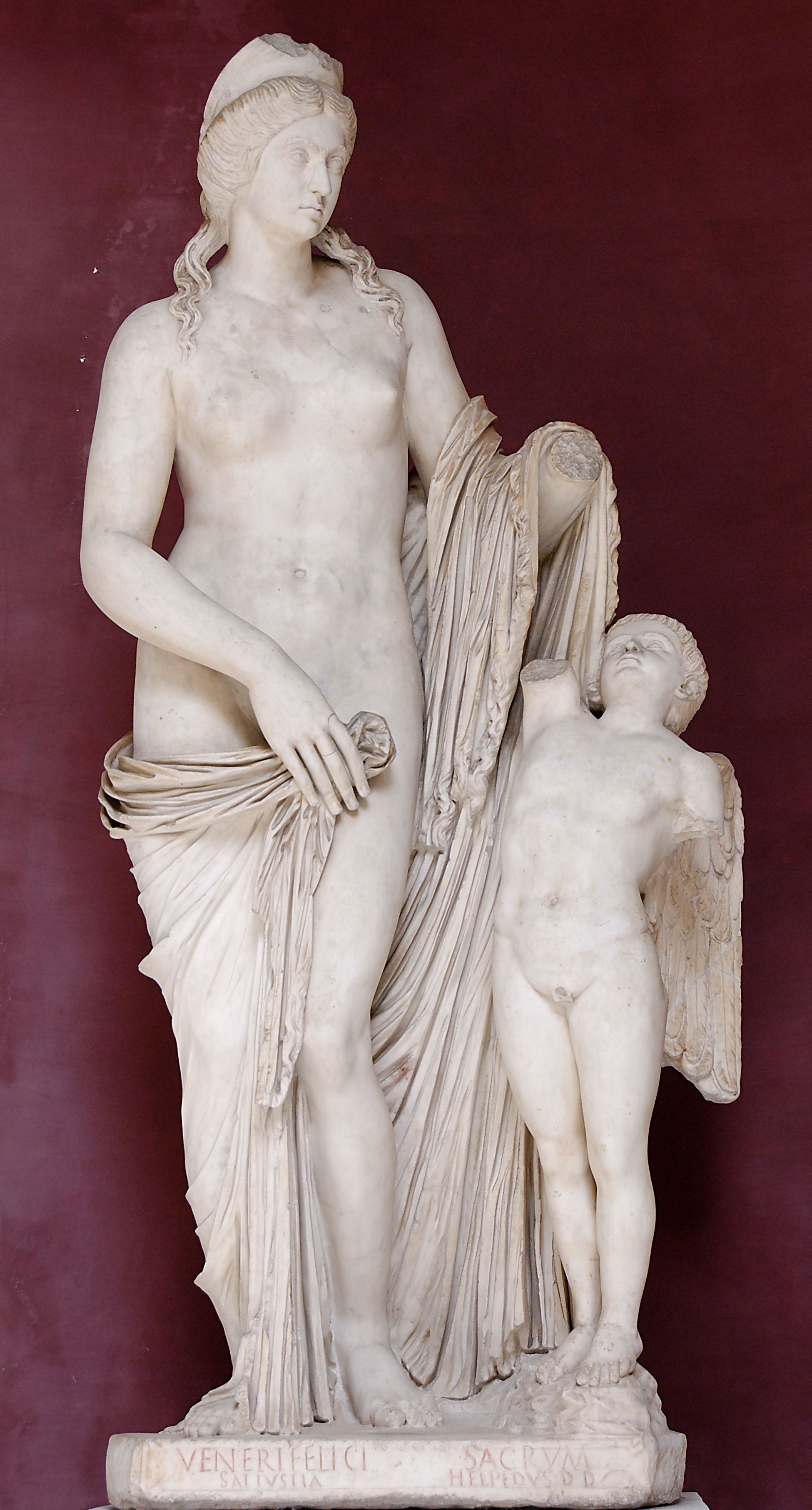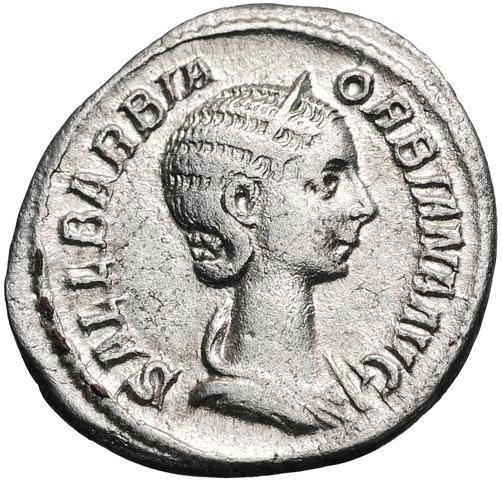Sallustia Orbiana on:
[Wikipedia]
[Google]
[Amazon]
Gnaea Seia Herennia Sallustia Barbia Orbiana (
 Orbiana was the daughter of Lucius Seius Herennius Sallustius, an influential
Orbiana was the daughter of Lucius Seius Herennius Sallustius, an influential
pp. 57, 58
Vagi, ''Coinage and History of the Roman Empire''
pp. 308, 309
Their union was short in duration and childless and it ended in August 227.''Orbiana'', Coinage and History of the Roman Empire, 82 BC '' - '' 480, Volume 1, David L. Vagi, Taylor & Francia, 2000, pg. 308.''Alexander's Court And Character'', The Life of Alexander Severus, Sir Richard Valentine Nind Hopkins, The University Press, 1907, pg. 57. Sallustius was proclaimed
a site devoted to Orbiana.
 A statue of Orbiana, depicted as ''
A statue of Orbiana, depicted as ''
Benario, Herbert W., "Severus Alexander (A.D. 222–235)", ''De Imperatoribus Romanis''
{{DEFAULTSORT:Orbiana, Sallustia 200s births 3rd-century Roman empresses Augustae Severan dynasty Orbiana Orbiana Orbiana
fl.
''Floruit'' (; abbreviated fl. or occasionally flor.; from Latin for "they flourished") denotes a date or period during which a person was known to have been alive or active. In English, the unabbreviated word may also be used as a noun indicatin ...
220s), usually known as Sallustia Orbiana, was a third century Roman empress, with the title of '' Augusta'' as the wife of Severus Alexander
Marcus Aurelius Severus Alexander (1 October 208 – 21/22 March 235) was a Roman emperor, who reigned from 222 until 235. He was the last emperor from the Severan dynasty. He succeeded his slain cousin Elagabalus in 222. Alexander himself wa ...
from AD 225 to 227. The emperor married her in late 225, following the death of his grandmother. Severus was around sixteen years of age at this time. She was known for her beauty, which was captured in multiple works of art. Possibly a victim of the jealousy of Julia Mamaea
Julia Avita Mamaea or Julia Mamaea (14 or 29 August around 182 – 235) was a Syrian noble woman and member of the Severan dynasty. She was the mother of Roman emperor Alexander Severus and remained one of his chief advisors throughout hi ...
, the emperor's mother, Orbiana was divorced and exiled to Libya
Libya (; ar, ليبيا, Lībiyā), officially the State of Libya ( ar, دولة ليبيا, Dawlat Lībiyā), is a country in the Maghreb region in North Africa. It is bordered by the Mediterranean Sea to the north, Egypt to the east, Suda ...
in 227.Herodian, vi. 1.
Life
 Orbiana was the daughter of Lucius Seius Herennius Sallustius, an influential
Orbiana was the daughter of Lucius Seius Herennius Sallustius, an influential Roman senator
The Roman Senate ( la, Senātus Rōmānus) was a governing and advisory assembly in ancient Rome. It was one of the most enduring institutions in Roman history, being established in the first days of the city of Rome (traditionally founded in ...
, in the early third century.Banchich & Lane, "Commentary on Book XII", ''apud'' Zonaras, p. 77. In August, 225, at about the age of sixteen, she wed the Roman emperor Severus Alexander
Marcus Aurelius Severus Alexander (1 October 208 – 21/22 March 235) was a Roman emperor, who reigned from 222 until 235. He was the last emperor from the Severan dynasty. He succeeded his slain cousin Elagabalus in 222. Alexander himself wa ...
, in an arrangement organized by the emperor's mother, Julia Avita Mamaea.Hopkins, ''The Life of Severus Alexander''pp. 57, 58
Vagi, ''Coinage and History of the Roman Empire''
pp. 308, 309
Their union was short in duration and childless and it ended in August 227.''Orbiana'', Coinage and History of the Roman Empire, 82 BC '' - '' 480, Volume 1, David L. Vagi, Taylor & Francia, 2000, pg. 308.''Alexander's Court And Character'', The Life of Alexander Severus, Sir Richard Valentine Nind Hopkins, The University Press, 1907, pg. 57. Sallustius was proclaimed
Caesar
Gaius Julius Caesar (; ; 12 July 100 BC – 15 March 44 BC), was a Roman general and statesman. A member of the First Triumvirate, Caesar led the Roman armies in the Gallic Wars before defeating his political rival Pompey in a civil war, an ...
, and by the end of August, 227, Orbiana was granted the title of ''Augusta''. According to Herodian
Herodian or Herodianus ( el, Ἡρωδιανός) of Syria, sometimes referred to as "Herodian of Antioch" (c. 170 – c. 240), was a minor Roman civil servant who wrote a colourful history in Greek titled ''History of the Empire from the Death o ...
, Mamaea became jealous of Orbiana, due to her desire to be sole ''Augusta''. She treated Orbiana cruelly, forcing her to take refuge with her father.
Finding Mamaea's abuse unendurable, Sallustius sought the protection of the Praetorian Guard
The Praetorian Guard (Latin: ''cohortēs praetōriae'') was a unit of the Imperial Roman army that served as personal bodyguards and intelligence agents for the Roman emperors. During the Roman Republic, the Praetorian Guard were an escort fo ...
, or the intervention of the emperor. Alexander was fond of Orbiana, but being reliant on his mother, he failed to take any action in defense of his wife or her father. Herodian further alleges that Sallustius was put to death in August of 227 through the schemes of Mamaea, on the pretext that he wished to use the Praetorian Guard to seize power for himself. Orbiana was stripped of her title, divorced, and exiled to the province of Libya in north Africa. Nothing further is known of her. Severus Alexander reigned for another eight years. He and his mother were slain in a mutiny in 235, clearing the way for the succession of Maximinus Thrax
Gaius Julius Verus Maximinus "Thrax" ("the Thracian"; – 238) was Roman emperor from 235 to 238.
His father was an accountant in the governor's office and sprang from ancestors who were Carpi (a Dacian tribe), a people whom Diocleti ...
, and ending the Severan dynasty
The Severan dynasty was a Roman imperial dynasty that ruled the Roman Empire between 193 and 235, during the Roman imperial period. The dynasty was founded by the emperor Septimius Severus (), who rose to power after the Year of the Five Empero ...
.Sallustia Barbia Orbianaa site devoted to Orbiana.
Depictions
 A statue of Orbiana, depicted as ''
A statue of Orbiana, depicted as ''Venus
Venus is the second planet from the Sun. It is sometimes called Earth's "sister" or "twin" planet as it is almost as large and has a similar composition. As an interior planet to Earth, Venus (like Mercury) appears in Earth's sky never f ...
Felix'', was unearthed near the church of Santa Croce in Gerusalemme
The Basilica of the Holy Cross in Jerusalem or Basilica di Santa Croce in Gerusalemme, ( la, Basilica Sanctae Crucis in Hierusalem) is a Catholic Minor basilica and titular church in rione Esquilino, Rome, Italy. It is one of the Seven Pil ...
. The marble, now in the ''Cortile Belvedere'', or Belvedere Courtyard, of the Vatican Museums
The Vatican Museums ( it, Musei Vaticani; la, Musea Vaticana) are the public museums of the Vatican City. They display works from the immense collection amassed by the Catholic Church and the papacy throughout the centuries, including several of ...
, was dedicated to the empress by her '' liberti'' Helpidius and Sallustia. Besides a limited emission of coinage in bronze and silver, several Roman gold coins were minted with Orbiana's visage. She was the only wife of Severus to be featured on coins. Careful attention was paid to the coinage of copper money during the reign of Severus. Following his reign, the art and undiluted quality of money declined.''A Guide to the Collection of Roman Coins at Eton College
Eton College () is a Public school (United Kingdom), public school in Eton, Berkshire, England. It was founded in 1440 by Henry VI of England, Henry VI under the name ''Kynge's College of Our Ladye of Eton besyde Windesore'',Nevill, p. 3 ff. i ...
: With an Appendix' About Some Byzantine
The Byzantine Empire, also referred to as the Eastern Roman Empire or Byzantium, was the continuation of the Roman Empire primarily in its eastern provinces during Late Antiquity and the Middle Ages, when its capital city was Constantinopl ...
Coins'', Francis St. John Thackeray, London, England, J.S. Virtue & Co., 1882, pg. 70.Severan dynasty family tree
Cultural references
Sallustia Orbiana is a character in ''Alessandro Severo'' (1716), anopera seria
''Opera seria'' (; plural: ''opere serie''; usually called '' dramma per musica'' or '' melodramma serio'') is an Italian musical term which refers to the noble and "serious" style of Italian opera that predominated in Europe from the 1710s to ...
libretto by Apostolo Zeno
Apostolo Zeno (11 December 1668 in Venice – 11 November 1750 in Venice) was a Venetian poet, librettist, journalist, and man of letters.
Early life
Apostolo Zeno was born in Venice to a colonial branch of the Zeno family, an ancient Ven ...
. This was later adapted as '' La Salustia'' (1732), set to music by Giovanni Battista Pergolesi
Giovanni Battista Draghi (; 4 January 1710 – 16 or 17 March 1736), often referred to as Giovanni Battista Pergolesi (), was an Italian Baroque composer, violinist, and organist. His best-known works include his Stabat Mater and the opera '' ...
.
References
Bibliography
*Herodian
Herodian or Herodianus ( el, Ἡρωδιανός) of Syria, sometimes referred to as "Herodian of Antioch" (c. 170 – c. 240), was a minor Roman civil servant who wrote a colourful history in Greek titled ''History of the Empire from the Death o ...
us, ''Tes Meta Marcon Basileas Istoria'' (History of the Empire from the Death of Marcus Aurelius).
* Joannes Zonaras
Joannes or John Zonaras ( grc-gre, Ἰωάννης Ζωναρᾶς ; 1070 – 1140) was a Byzantine Greek historian, chronicler and theologian who lived in Constantinople (modern-day Istanbul, Turkey). Under Emperor Alexios I Komnenos he hel ...
, ''Epitome Historiarum'' (Epitome of History), Thomas Banchich, Eugene Lane, eds., Routledge (2009).
* ''Museo Vaticano'' (1846).
* Theodor Mommsen
Christian Matthias Theodor Mommsen (; 30 November 1817 – 1 November 1903) was a German classical scholar, historian, jurist, journalist, politician and archaeologist. He is widely regarded as one of the greatest classicists of the 19th centur ...
''et alii'', ''Corpus Inscriptionum Latinarum
The ''Corpus Inscriptionum Latinarum'' (''CIL'') is a comprehensive collection of ancient Latin inscriptions. It forms an authoritative source for documenting the surviving epigraphy of classical antiquity. Public and personal inscriptions throw ...
'' (The Body of Latin Inscriptions, abbreviated ''CIL''), Berlin-Brandenburgische Akademie der Wissenschaften (1853–present).
* Sir Richard V. N. Hopkins, ''The Life of Severus Alexander'', University Press (1907).
* Stéphane Gsell, ''Inscriptions Latines de L'Algérie'' (Latin Inscriptions from Algeria), Edouard Champion, Paris (1922–present).
* Rodolfo Lanciani, ''Wandering Through Ancient Roman Churches'', Kessinger Publishing (1924, 2003).
* David L. Vagi, ''Coinage and History of the Roman Empire, c. 82 B.C.–A.D. 480: Coinage'', Taylor & Francis (2000).
* Roger M. Kean, Oliver Frey, ''The Complete Chronicle of the Emperors of Rome'', Thalamus (2005).
External links
Benario, Herbert W., "Severus Alexander (A.D. 222–235)", ''De Imperatoribus Romanis''
{{DEFAULTSORT:Orbiana, Sallustia 200s births 3rd-century Roman empresses Augustae Severan dynasty Orbiana Orbiana Orbiana